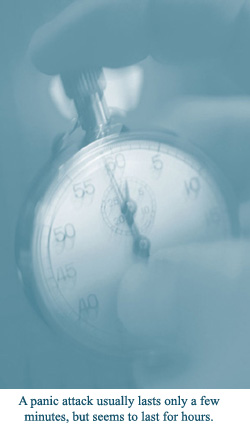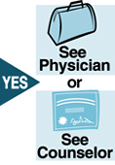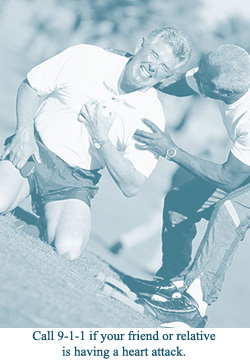Panic Attacks
| A panic attack is a brief period of acute anxiety
that comes on all of a sudden. It occurs when there is no real
danger. It comes without warning.
Four or more of the following symptoms define a panic attack:
A person having a panic attack may rush to an emergency room because they think they are having a heart attack, feel like they are going to die, or think they are going crazy. Persons who have repeated panic attacks begin to avoid situations they associate with past attacks. For example, if the panic attack took place in a grocery store and the person had to leave the store to get home to feel safe, the person avoids future trips to the grocery store. This can lead to a phobia called agoraphobia. (See “Phobias”.) |
 |
A person who has four or more panic attacks in any four week period could have panic disorder. The disorder can also be present if the person has less than four panic attacks in four weeks, but is afraid of having another panic attack.
Panic attack symptoms can be symptoms of many medical conditions. These include heart attack, hyperthyroidism, and low blood sugar. The symptoms can also be a side effect of drug abuse or some medications. It is important to rule out any medical reasons for panic attack symptoms. Most persons who have panic disorder consult with their doctor 10 or more times before their condition is accurately diagnosed.
Treatment
|
|
Medication. Certain
antidepressants and anti-anxiety medicines are used. |
|
|
Therapy. One type helps
the person “reshape” the way they think to avoid panic attacks.
Another type uses relaxation methods and a gradual exposure to
situations they have avoided due to fear of another panic attack. |
|
|
Support groups. These provide understanding and positive feedback to the sufferer. |
Questions to Ask
|
 |
|
|
|
|
 |
|
|
|
Do you avoid certain situations or places because they make you feel anxious and you think they will put you in danger? |
 |
|
|
|
Do you use alcohol or drugs to help you deal with situations that provoke the thought of another panic attack? |
 |
|
|
|
|
|
Self-Help
(Note: Many of these tips are used in the context of being in therapy first before the person can do them on their own.)
Ways to deal with panic that has limited symptoms and duration:
|
|
Talk over the source of your anxiety with family, friends and clergy. If this is not enough, you may need the help of a professional counselor. |
|
|
Face the fear. Accept it. Don’t fight it. (This may require external help.) |
|
|
Remind yourself you are in no real danger. |
|
|
Try to imagine that you are “floating” on water. |
|
|
Let time pass. Try to think ahead to what tasks you need to do when the panic will be gone. |
|
|
Do one or more mental “stress rehearsals.” Imagine yourself feeling calm and handling the situation well. |
|
|
Use the “Now Awareness Technique”. |
|
|
Use bibliotherapy - read a self-help book on panic attacks. |
|
|
Minimize exposure to things that cause distress. |
|
|
Keep things with you that will provide
comfort and a sense of control in case another panic attack occurs.
Examples:
|
|
|
Prepare for stressful situations. For
example, if you need to give a group talk or presentation:
|
|
|
Be well prepared for exams or work demands. Prioritize tasks so you’re not overwhelmed. |
|
|
Learn and practice stress management techniques. (See “Stress - Self-Help”.) |
|
|
Limit your caffeine intake. |
What You Can Do for a Friend or Relative
|
 |
